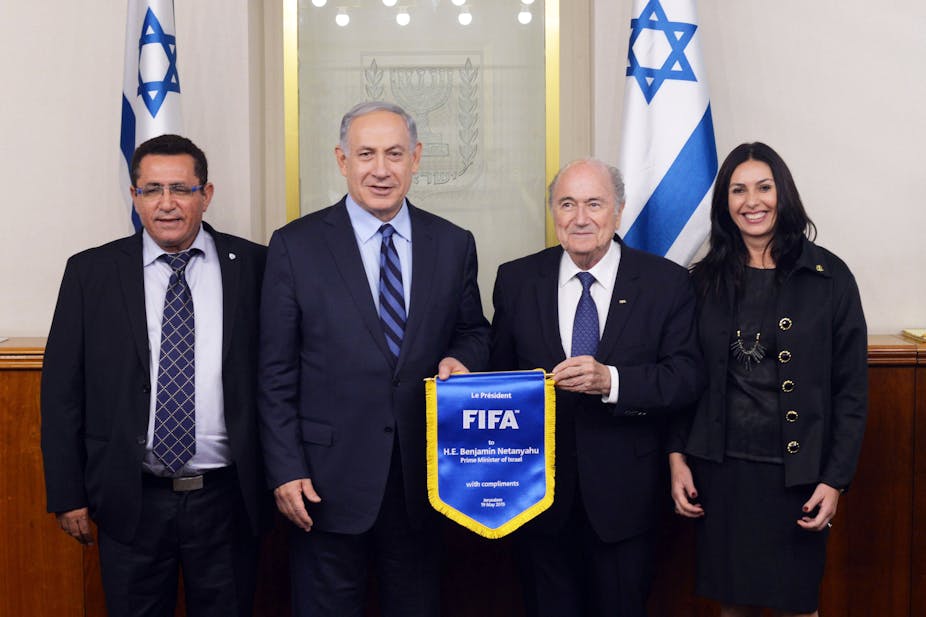To its many critics, FIFA has been painfully slow to adjust to the new equality conventions of the developed world. Its male leaders have often been clumsily patronising (and worse) in response to demands for more elite-level female play, and they have been slow to recognise and punish overt racism when it has occurred on its patch.
Now, in a test of its political backbone, one of FIFA’s members is crying racism – and it’s calling for an immediate expulsion from the family.
Recognising stateless Palestine as a FIFA member in 1998 seemed like an unusually political act. Now Palestine wants FIFA to take sides in the Middle East conflict by ejecting Israel from the football family of nations at its Congress in São Paulo on 28-9 May 2015. Could it have a case – and does it have a chance of success?
Proxy war
Palestine claims that the violent harassment, travel restrictions and checkpoints imposed by the Israeli authorities as part of the militarised separation of the West Bank and Gaza effectively mean that the development of the game in Palestine is severely hamstrung by a fellow FIFA member.
Meanwhile, clubs from illegal Israeli settlements are warmly welcomed into domestic football competition by the Israel Football Association, and chants of “death to the Arabs” at matches involving the exclusively Jewish Beitar Jerusalem club go unpunished. Beitar’s coach, Guy Levi, recently assured radio listeners in Israel that the club would never sign an Arab player.
In 2014, FIFA set up a task force to try to defuse the escalating situation, but it has been unable to make much impact. Embarrassingly, on a fact-finding trip to Hebron in May 2015, a FIFA delegation was harrassed by settler protests.

Now, The Guardian has carried a letter calling for the suspension of the Israeli FA, citing abuse of Palestinian players and the racial segregation of part of the national children’s league in Israel. Signed by left-leaning intellectual, spiritual and artistic luminaries from around the world, it reminds of football’s unique power to refocus the world’s attention on the impasse in the Middle East.
Perhaps inevitably, Israel claims that Palestinian coach and player movement is a key security issue, a potential cover for the movement of weapons and militants. It’s also urging FIFA to back off and stick to its usual stance of keeping football and politics apart.
Ironically, the Palestinian appeal to FIFA uses a similar premise, claiming that it is precisely racial and political machinations in the region which are suffocating the Palestinian game. The Palestinians’ conclusion is that Israel is the problem and that it must be sanctioned accordingly.
Of course, this is hardly the first time FIFA has been caught in the crossfire of difficult politics.
Troubled oasis
Like other global sporting bodies, FIFA has come to see itself as a bridge between rival states. It’s meant to be a non-political oasis, where warring factions and otherwise unfriendly nations can meet and break bread on level ground – rather than trying to break each other’s legs.
But right from its origins back in 1904, the British football authorities were wary of FIFA’s wider ambitions. They argued that football should have no other purpose than playful competition, including, but only if absolutely necessary, competing with Johnny Foreigner. The tension made FIFA’s early decades painful: in 1935, the Germans danced diplomatic rings around the FA by securing a prestigious international fixture at White Hart Lane, home of Tottenham Hotspur, just as the Nazis were gearing up for what became the Holocaust.
All this meant that in the first half of the 20th century, the countries of the UK tried hard to keep their distance from international football. They were constantly falling out of FIFA, whose members saw football not as a focus for nationalist bravado but as a means of healing deep wounds – in George Orwell’s famous words, a symbolic “war without weapons”.
After World War II, Britain finally joined FIFA for good and entered the World Cup finals late in 1950. But by 1974, FIFA’s patrician English president, Stanley Rous, was being ruthlessly ousted by those who had now begun to see the modern game in quite different terms to the British: as a deeply commercialised medium for global power brokerage.
The result is today’s FIFA, which is a strange, unaccountable hybrid. On the one hand, it’s a post-colonial, one-member-one-vote democratic force for previously marginalised and voiceless smaller nations. On the other, it’s a craven and possibly deeply corrupt vehicle for the ambitions both of its leaders and global corporations.
Above it all
It’s not as if FIFA has never taken a groundbreaking political stand. The exclusion of apartheid South Africa from international competition in 1961 was a victory for FIFA’s newly empowered black African caucus, but since then the federation has tried hard to maintain its carefully nurtured apolitical image as a benign global sporting family.

It seems today’s FIFA just wants to be a force for international good and minor income redistribution, and one which is beyond and above policing the local disputes of its member countries.
The current FIFA president, Sepp Blatter, has bloated ambitions for football as a vehicle for global peace, but he has little stomach for this sort of political grandstanding, especially in what seems like an intractable conflict. There is also little chance that the required two-thirds majority to eject Israel will be reached in São Paulo, which will set a poor precedent for future political campaigns within the federation.
But the Palestinians have made their case loudly and clearly. Once again, they have shown the symbolic power of football and the uneasy historical balancing act that FIFA faces in managing its supposed equality agenda against the tattered and discredited principal that sport and politics are, justifiably, quite separate realms.

